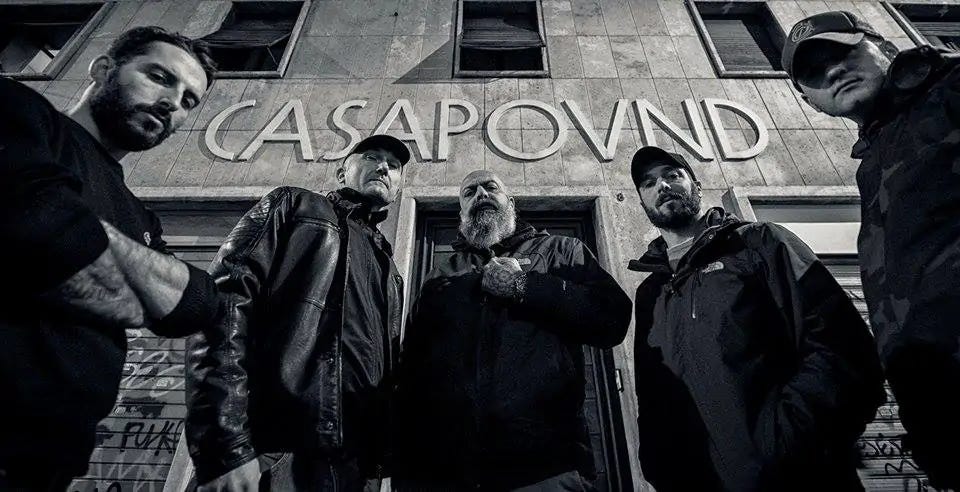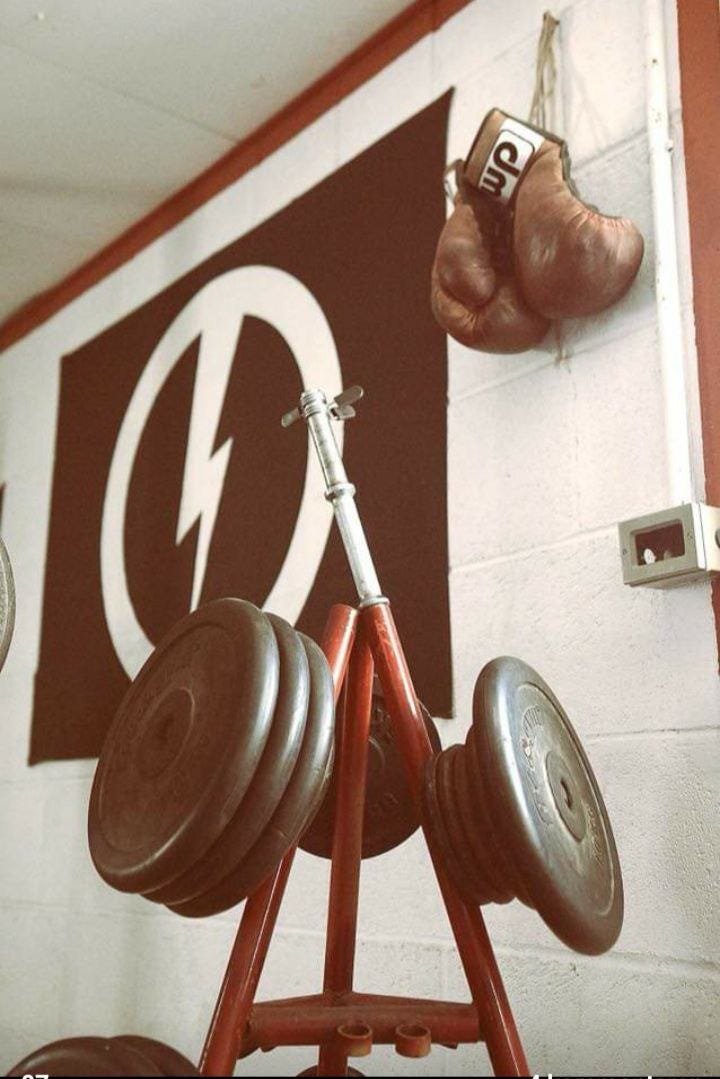I knocked on the big metal doors of a commercial building on a quiet Roman street. I had no contact name—just an address. It came from some random account I found while going down a European nationalist rabbit hole on social media.
It was around 2013. My first time back in Italy since childhood, since those family visits that left more flavor than memory. I was there with a chick, planning the usual romantic getaway. The Colosseum. Wine. Ruins. But one square on the itinerary was mine. One day, one reason I really came to Rome: CasaPound
.
A small metal window slid open with a loud clang. A guy with a close-cropped crew cut poked his head out and shouted something in Italian I didn’t understand. I blurted out, “Uh, hey—I’m from New York. I’m a nationalist. Big supporter of CasaPound. Can I come in or something?”
He glanced up and down the street, puzzled, then shrugged. “Mmh... okay. You come in.”
Minutes later, I was inside, being shown around by one of their guys.
The stairwells smelled like sweat, spray paint, and espresso. There was a boxing gym on one floor. A bookstore on another. Kids played in hallways under framed portraits of Julius Evola and Ezra Pound, hanging beside war flags and vinyl records. I couldn’t help but smile
.
Later, I was told to check out one of their restaurants near the Colosseum. So we did. I was mid-bite, fully impressed with the whole scene, when he walked in—Gianluca Iannone, frontman of Zetazeroalfa and the founder of CasaPound itself.
I got up, probably too fast, and awkwardly shook his hand. Told him I was a supporter all the way from New York. He slid his sunglasses up, gave a slight grin, and said he was surprised. Told me I was only the second American he’d ever met who came out to visit.
I don’t know if he remembers. But I do.
The Soundtrack of Fascism for Third Millennium
To understand CasaPound, you start with Zetazeroalfa, the soundtrack of Italian nationalist rebellion. In the late ’90s, deep in Rome’s underground scene, the band emerged like a war chant—raw, iron-willed, unapologetic. Founded in 1997 by Iannone, the band didn’t just play music. It was a counter culture.
Their shows weren’t concerts. They were political baptisms. Lyrics that sounded like they were written with trench knives . Music for punk rock’s blackshirts. It was a sound that could make an Arditi vet grin through bloody lips.
Young militants came from across Italy to see them play in places like Rome’s Cutty Sark Pub. The problem? After the mosh pits, after the shouting and stomping, there was nowhere for them to go.
So, under the watchful eyes of D’Annunzio’s portrait hanging in the bar, they hatched a plan: their own Fiume. They’d seize a building. Just like the poet-soldier did in 1919 when he marched on Fiume with a crew of radicals and declared a micro-nation built on aesthetics, passion, and iron.
In 2003, they found their building. Finished their espressos. Black turtlenecks on. Bolt cutters in hand. And they moved.
Within hours, they were on the rooftop of an eight-story Rome building, toasting their conquest. Gianluca raised the flag.
CasaPound was born. Fiume reloaded
.
Parallel State of Mind
The journalists cried about them being fascists. Obsessed over tattoos and slogans. But CasaPound didn’t blink. Me ne frego. I don’t care. That became fuel.
While mainstream parties begged for TV time and Twitter clout, CasaPound built parallel institutions—cafés, publishers, gyms, festivals, even fashion. They weren’t chasing votes. They were building a counter-culture. A life. A world.
The building itself was renamed after Ezra Pound, the American fascist poet and patron saint of the culturally dispossessed. Inside, books on Mussolini and Nietzsche sat beside crates of beer and a stack of boxing gloves.
They called it a “Social Center”, not a headquarters:
Housing for Italian families left behind
Venues for punk shows, debates, conferences
Gyms, publishing houses, propaganda studios, soup kitchens
At one point during my visit, I asked a guy—he introduced himself as their "foreign emissary"—what their turtle flag meant.
He looked at me seriously. “Because the turtle carries its home on its back. Just like us.”
He didn’t need to say more. This was Fascism of the Third Millennium. And it wasn’t like anything I’d seen back home.
More Than a Moment
Under Gianluca’s leadership, CasaPound didn’t just survive. It expanded. Chapters opened across Italy. They held conferences with nationalists from across Europe. I even came back years later—this time with a crew from US after a boxing event in germany—and stayed in the building’s hostel.
Back in the U.S., activism usually meant a handful of guys yelling edgy slogans into a GoPro. Trolling as strategy. Here? Young men were posted on street corners all day, handing out pamphlets, actually talking to people. Their propaganda was designed to attract—not repel.
In 2019, Iannone announced that CasaPound would pull back from party politics and return to its roots as a social movement.
They don’t run for office. They run neighborhoods.
The Concrete Legend
Today, CasaPound still has a presence in nearly every major Italian city. The original building still stands—a concrete legend in the Esquilino district, looming like a wartime relic no one dares touch.
Its influence reaches far beyond Italy. Through Europe’s underground music scene. Through nationalist circles in across the content and beyond ( i was heavily inspired by them to start many projects in the US.) Even its enemies watch it with morbid curiosity.
Because CasaPound proved a point:
If you blend culture, conviction, and action you can create your own path foward.
.






